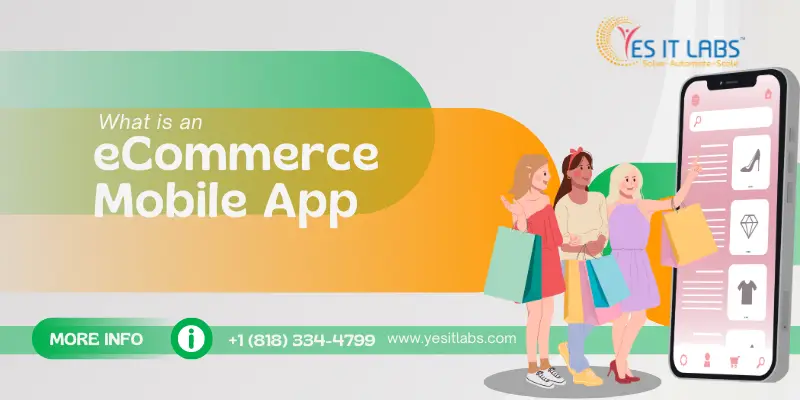 By Jones Roberts
By Jones Roberts Exploring the Landscape: Types of eCommerce Mobile Apps
Hey there, fellow digital enthusiasts! Today, we’re delving into the dynamic realm of eCommerce mobile apps. If you’re curious about what they are, how they’re changing the game, or even how to create one, you’ve come to the right place. So, buckle up as we embark on this exciting journey through the world of eCommerce on your handheld device!
The different types of eCommerce mobile apps
- Native eCommerce Apps: Ahoy there, matey! Native apps are the captains of the eCommerce fleet. Crafted specifically for a single platform (iOS or Android), these apps offer unparalleled performance and user experience. They’re like the sleek speedboats of the eCommerce world, optimized to take full advantage of the device’s capabilities. Aye, they may require more resources to maintain separate codebases, but their smooth sailing through app stores and superior functionality make them worth their weight in gold doubloons.
- Hybrid eCommerce Apps: Avast ye! If you’re looking for a vessel that can sail across multiple platforms with ease, hybrid apps might be your treasure trove. These apps are built using web technologies like HTML, CSS, and JavaScript, wrapped within a native container. Picture a sturdy merchant ship with the agility to navigate different waters. While they may not offer the same level of performance as native apps, their cost-effectiveness and faster development timelines make them a popular choice for many eCommerce adventurers.
- Progressive Web Apps (PWAs): Shiver me timbers! Set your sights on the horizon with PWAs, the swashbucklers of the eCommerce realm. These web-based applications offer a seamless experience across devices, combining the best of both worlds – the accessibility of a website and the functionality of a native app. With features like offline access and push notifications, PWAs are like the versatile schooners, ready to weather any storm. And the best part? No need to download from the app store – just bookmark the site, and you’re good to go!
- Augmented Reality (AR) eCommerce Apps: Ahoy, me hearties! Prepare to be dazzled by the wonders of AR. These futuristic galleons bring the shopping experience to life by overlaying digital content onto the real world. From trying on virtual clothes to previewing furniture in your living room, AR eCommerce apps offer a treasure trove of immersive experiences. While still in its infancy, AR holds the promise of revolutionizing the way we shop online, turning every purchase into a grand adventure on the high seas.
- Voice Commerce Apps: Avast, landlubbers! Cast off the shackles of traditional interfaces and embrace the power of voice. With voice commerce apps, you can navigate the eCommerce waters hands-free, using nothing but the sound of your voice. Whether you’re ordering groceries or replenishing your treasure chest of gadgets, voice assistants like Siri and Alexa are ready to heed your every command. As the winds of technology continue to blow, voice commerce apps are poised to become an integral part of the eCommerce ecosystem.

What is an eCommerce Mobile App?
Let’s kick things off with the basics. An eCommerce mobile app is essentially a digital storefront that allows users to browse, purchase, and interact with products or services directly from their smartphones or tablets. Think of it as your favorite brick-and-mortar store, but conveniently condensed into a pocket-sized app, accessible anytime, anywhere.
The Scope of eCommerce Mobile Apps
Now, you might be wondering, “Why bother with an eCommerce mobile app when I can just shop online through a website?” Ah, my friend, the scope of eCommerce mobile apps extends far beyond mere convenience. Here’s why they’re a game-changer:
- Enhanced User Experience: Mobile apps offer a smoother, more intuitive shopping experience compared to traditional websites. With features like personalized recommendations, one-click purchasing, and seamless navigation, they’re designed to keep users engaged and coming back for more.
- Improved Accessibility: In today’s fast-paced world, people crave instant gratification. eCommerce mobile apps cater to this need by providing quick access to products/services with just a few taps on the screen. Plus, they’re available 24/7, making shopping truly convenient for users across the globe.
- Increased Engagement: With push notifications, in-app messaging, and interactive features, eCommerce mobile apps foster deeper engagement with customers. Whether it’s notifying them about upcoming sales, offering exclusive deals, or soliciting feedback, apps enable businesses to establish meaningful connections with their audience.
- Seamless Integration: eCommerce mobile apps seamlessly integrate with other digital technologies like augmented reality (AR) and artificial intelligence (AI) to deliver innovative shopping experiences. From virtual try-on features to chatbots for customer support, the possibilities are endless when it comes to leveraging emerging technologies.
Creating an eCommerce Mobile App: Where to Begin
So, you’re sold on the idea of building your own eCommerce mobile app. Where do you start? Don’t worry; we’ve got you covered. Here’s a step-by-step guide to get you on the right track:
- Define Your Goals: Before diving into development, clearly define your objectives for the app. Are you looking to increase sales, improve customer loyalty, or expand your brand’s reach? Understanding your goals will inform every aspect of the app-building process.
- Choose the Right Development Partner: Unless you’re a seasoned app developer yourself, partnering with a mobile app development company is your best bet. Look for a team with expertise in eCommerce app development, a solid portfolio, and a collaborative approach to ensure your vision translates into reality.
- Market Research: Conduct thorough market research to identify your target audience, analyze competitors, and pinpoint market trends. This information will help you tailor your app to meet the needs and preferences of your potential customers effectively.
- Design and Development: Work closely with your development team to design a user-friendly interface and incorporate essential features such as product catalog, shopping cart, secure payment gateways, and social sharing options. Focus on creating a seamless, visually appealing experience that aligns with your brand identity.
- Testing and Feedback: Once the app is developed, don’t rush to launch it just yet. Conduct rigorous testing to identify and fix any bugs or glitches. Additionally, gather feedback from beta testers to uncover usability issues and make necessary improvements before releasing the app to the public.
- Launch and Promote: Congratulations, your eCommerce mobile app is ready to make its debut! Roll out a strategic marketing campaign to generate buzz and attract users to download the app. Leverage social media, email marketing, influencer partnerships, and app store optimization (ASO) techniques to maximize visibility and downloads.
- Monitor and Iterate: The work doesn’t stop after the app is launched. Continuously monitor user engagement metrics, gather feedback, and iterate based on insights to enhance the app’s performance and user experience over time.
Conclusion
And there you have it, folks! A comprehensive guide to eCommerce mobile app development, from understanding what they are to exploring their vast potential and even embarking on the journey of creating your own. In today’s digital age, where mobile devices reign supreme, eCommerce mobile apps are more than just a trend; they’re a necessity for businesses looking to thrive in the ever-evolving landscape of online commerce. So, whether you’re a seasoned entrepreneur or a budding startup, now’s the time to harness the power of mobile technology and take your eCommerce business to new heights!
So, what are you waiting for? Dive headfirst into the world of eCommerce mobile apps and unlock a world of endless possibilities. Happy app-building!
Tags: best mobile app development company usa, eCommerce mobile app development, eCommerce mobile apps, mobile app development company, mobile appsLatest Resources
Key Benefits of React Native App Development
January 7, 2025
Leveraging AI in Startup Software Development: Trends and Tips
December 30, 2024
Mobile Optimization for Shopify Apps: Best Practices
December 23, 2024
Leveraging ARKit: Transforming Augmented Reality for iOS Apps
December 6, 2024
Custom vs. Template Websites: What’s Best for Your Business?
December 3, 2024











 Services
Services

